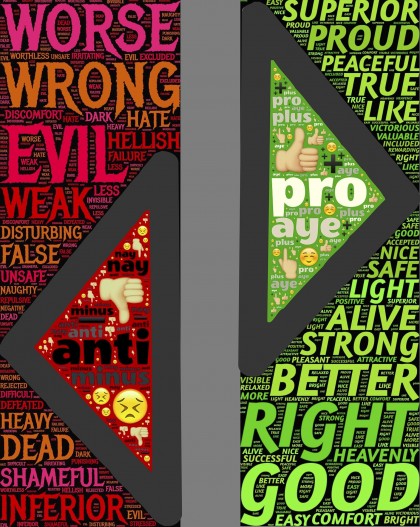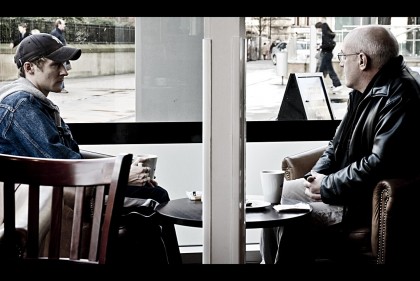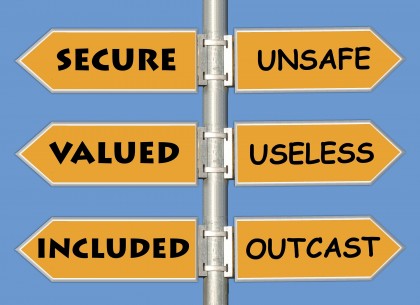Our Enemies, Our Selves.
Kate Whittaker Cousino | Jun 14, 2018

Do you know anyone who has seemingly transformed from a reasonable, moderate person to an impassioned ideologue?
A few months ago, there was a small furor in my circles when a former pro-life activist was revealed to be a white nationalist. She hadn't always held these opinions—in fact, when she was young, she'd started out on the liberal side of the political/social spectrum before shedding those beliefs to become moderately right-wing. Her political and ideological "conversion" gave her a platform and perspective that made her popular among social conservatives.
Somewhere along the line, though, without many people noticing, her ideas had shifted further and further into an extreme that now horrified many of her former admirers.
This isn't the first time someone—a convert to a cause, a religion, or a political ideology— has journeyed from one extreme end of the spectrum all the way through moderation and conversion towards the opposite extreme. What does it mean? How do you make sense of it when someone you identified with turns and rejects values you'd once shared in common?

The easy way out is to conclude that the virtue or commonality that seems to have been lost was never really there to begin with. We were deceived as to the true nature of this friend-turned-foe. They succumbed to a hidden darkness or hatefulness, or they've sold out for something selfishly satisfying like attention or monetary gain.
But when we assign the basest of motivations—or even worse, simply relegate those who hold objectionable views to an inexplicable "other"—when we explain away different ideologies as sympathetic only to the very stupid or very evil, we lose sight of the common humanity of our ideological opponents. They may differ in opinions and agendas, but the human motivations and desires that drive ideological extremism are common to many of us.
There is a common set of human emotional responses which drive a deep compulsion towards the safety of belonging to an ever-more-exclusive community. Community, of whatever kind, both requires and engenders trust, and that trust predisposes us to listen and be open to persuasion.
Our "enemies" may not be that different from ourselves. They may have merely stumbled into a different place to belong.
There but for the grace of God go I.
This came up in discussion with a friend a while back, and she agreed:
Who you are around absolutely impacts your views! I was on the brink of anarcho-libertarianism while hanging out with a group in which a man with a strong personality was preaching that. I saw the light when another young man came to me and some other mods in a message board asking for help because he was being abused. And while the response from CPS was weak, in anarcho-libertarian land, there would not have been a response at all. [Other friend] stayed there a whole lot longer, and was still anti-police and skewing MRA after I left.
The research bears this out. It isn't intelligence, knowledge, education, or analytical skills that determine which sources of information we trust. It's about who we trust.
An examination and comparison of Italian online conspiracy and science-based groups showed that both groups showed similar patterns of in-group polarisation and emotionally-based engagement with outside information and topics. In both the groups dedicated to scientific ideals and the groups that united over conspiracy theorising, frequency of activity within the online community was found to correlate with more negative emotional responses.
The more deeply invested in belonging to the community a user was, the more they displayed fear, anger, and distrust of information and ideas originating from outside the group—regardless of the actual substance, veracity, or soundness of the information.
When someone helps you when you are down, supports you when you are ill or in trouble, encourages you when you are discouraged, and affirms your strength, goodness, and independence when you feel uncomfortable with mainstream ideas or norms, you are going to tend to care about that person’s opinions, trust their motivations, and let them influence and guide you.

So what’s the lesson here? Merely to be careful not to associate with the wrong people?
I don’t think that’s enough. The same group movement towards extreme opinions can happen even among people initially united by positive ideals.
Individuals more extreme than average in the group-favored direction—the direction favored by most individuals before discussion—are more admired. They are seen as more devoted to the group, more able—in sum, as better people. This extra status translates into more influence and less change during group discussion, whereas individuals less extreme than average in the group-favored direction have less influence and change more. No one wants to be below-average in support of the group-favored opinion, and the result is that the average opinion becomes more extreme in the group-favored direction. [Emphasis mine]
In contrast, in people who have a fairly broad set of relationships with different foundations, the movement from relationship to trust to empathy and identification can be a fairly healthy, important force in promoting moderation and true tolerance—not relativism, but respect for the good will and ideals of those with different perspectives and beliefs.
For many of us, the greatest diversity in our relationships comes precisely from those people we bonded with over shared experiences and hobbies: the friends we made in high school, the coffee-shop Scrabble opponent, the gym buddy, the choir friend, the pickup game opponent, the fellow volunteer, the co-worker, the good neighbour. When we have close friends, family, or spouses with differing beliefs, we tend to become more moderate with time, rather than more extreme.
We cannot have or maintain these friendships if we divide the world into "us" and "them." The best of these friendships are based on interacting with persons as subjects. Our friends are people with intrinsic value who have their own understandings, their own histories, their own journeys.
These person-based friendships challenge us to find compassion and humility even in the midst of disagreement.
